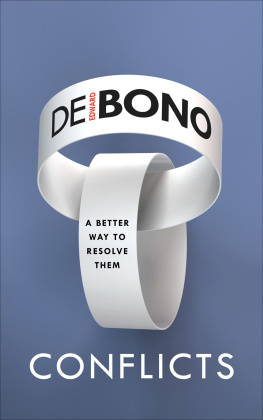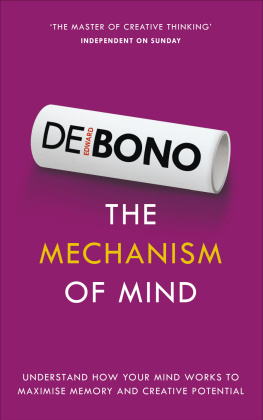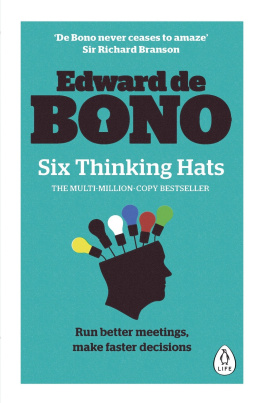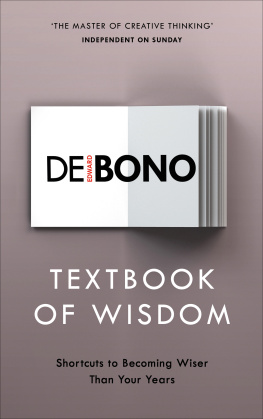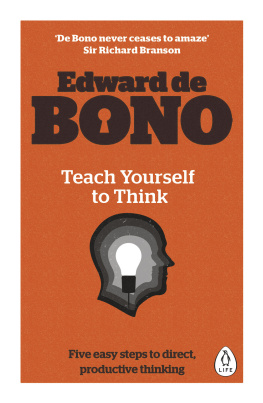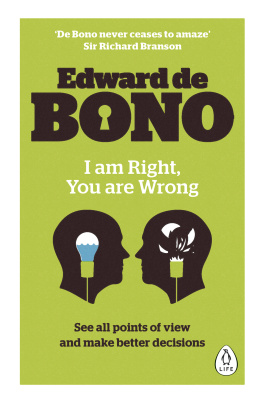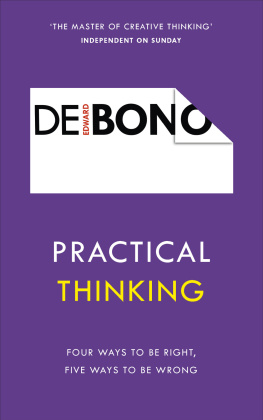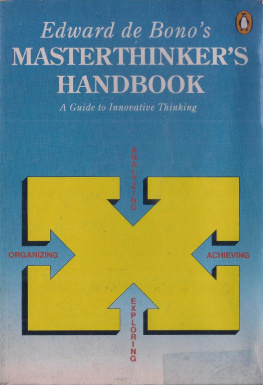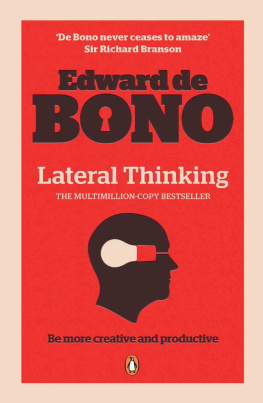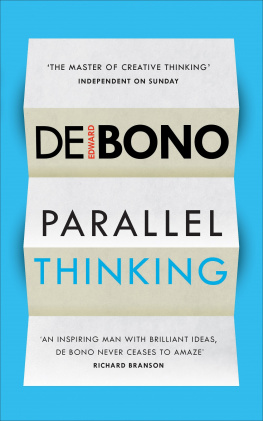CONTENTS
ABOUT THE BOOK
Think, dont fight.
In todays world we use an out of date thinking system to navigate our way through modern society, especially when it comes to conflicts and disagreements.
Conflicts argues that instead of our age old system of debate we should adopt what de Bono calls a design idiom and use lateral thinking to navigate a feud. If two parties think their argument is best, we should be introducing a third party role. De Bono explains how this concept of triangular thinking and map making is the way forward.
By highlighting how the current system holds us back and offering practical alternatives De Bono paves the way for a fundamental shift in conflict resolution.
ABOUT THE AUTHOR
Edward de Bono studied at Christ Church, Oxford (as a Rhodes Scholar). He also holds a PhD from Cambridge and an MD from the University of Malta. He has held appointments at the universities of Oxford, London, Cambridge and Harvard.
In 1967 de Bono invented the now commonly used term lateral thinking and, for many thousands, indeed millions, of people worldwide, his name has since become a symbol of creativity and new thinking. He has written numerous books, which have been translated into 34 languages, and his advice is sought by Nobel laureates and world leaders alike.
www.debono.com
PROLOGUE
We do have to accept that our methods of solving major disputes and conflicts have been crude and primitive, inadequate and expensive, dangerous and destructive. The increasing complexity of the world and the increasing power of our weaponry force us to rethink our conflict-solving methods.
Even if we were to operate our traditional methods with the best will in the world and with the highest available intelligence, these methods would not suffice. There is a need for a fundamental shift in our thinking approach to the resolution of conflicts.
In this book I do not presume to set down an instant answer but I intend to indicate a road along which, I believe, we must travel. I shall go further and indicate some of the first steps that can be taken.
Amongst these first steps is a reappraisal of our esteemed argument/clash type of thinking. I shall attempt to point out the attractions, dangers and limitations of this traditional method. I shall suggest that conflict thinking about conflict is inadequate and that we must shift to the design type of thinking with its creative input.
I find no villains but intelligent people locked by the logic and continuity of their positions into the argument/clash mode. It is unfortunate that the parties most directly involved in a dispute may be in the worst position to settle the dispute this is as if the Bondi Beach lifeguards were all unable to swim.
There are three roads to conflict resolution: fight/litigate; negotiate/bargain; design a way out. Only the first two are available to the disputants. The design road demands a third party that can look at the situation from the third party angle. For this reason I introduce the concept of triangular thinking. This third party is neither judge nor negotiator but a creative designer.
You can propel a heavy ball across a sponge surface by pushing the ball or by depressing the surface just ahead of the ball, thus leading it forward. That has always been the power of ideas.
We do have to accept that our methods of solving disputes and conflicts are crude and primitive, inadequate and costly, dangerous and destructive.
Even if we operate these methods with the best will in the world and with the highest intelligence, they will not suffice. There is a need for a fundamental shift in our approach to the resolution of conflicts.
INTRODUCTION
An Aztec priest slices open the chest of the living victim with a knife made of lava glass. The victim is held arched backwards over a stone altar in order to separate the ribs. The priest plunges in his hand, tears out the victims heart and holds it aloft. The heart continues to pulsate and squirm in the priests hands. The discarded victims body is tossed down the steps of the pyramid.
From our standpoint today that behaviour may seem cruel and primitive. From the standpoint of that time, the behaviour was glorious and noble and most enthusiastic (in the true sense of that word: with God).
Can we conceive a time when our descendants will look back in just such a manner, to regard as cruel and primitive the way in which we now seek to solve disputes and conflicts by killing people on rather a large scale? The technological sophistication with which that is carried out will not disguise the primitiveness of the underlying principle.
The next and last war is logically inevitable. I use the word last both in the horrific sense of considerable destruction and also in the logical sense of the last of a series.
There was a time when family fought family. Then tribe fought tribe. City fought city in Greece and later in Italy. Then nations became the fighting units. As weapons increased in power so the units became bigger. As the expense of war increased only bigger units could afford it. As communication technology improved, cultures and values became more uniform. In Europe today it would be unthinkable for England to declare war on France or for Germany to attack Austria. Yet, less than a lifetime ago, wars on this scale were very thinkable. The superpower bloc is the next logical progression. After that the technology of communication, the interlocking of economies and the cost of war should make the idiom obsolete on any major scale.
Do we have to proceed through this logical inevitability or can we bypass it?
Consider a heavy ball bearing suspended by a cord directly above a delicate crystal goblet. The cord is on fire. There is a certain logical inevitability that the glass is due to be shattered. The components are in place and if they work out their destiny according to present behaviour the ball will fall on the glass and shatter it. Something untoward might happen: a breeze may extinguish the fire. If you owned that glass would you wait for something unexpected to rescue the glass or would you want to be rather more constructive?
In a similar way all the pieces are in place for disastrous conflicts up to and including nuclear war. There is the logic of weapon technology and the logic of armament competition. There is the logic of deterrence. There is tension and hostility and lack of communication. There are crude and primitive ways of handling this through institutions like the United Nations, which is structurally inadequate for the role. There are very old-fashioned concepts and idioms of thinking which work to inflame conflict rather than design a way out of it.
We cannot conceive of new concepts until after we have conceived of them.
For thousands of years the great civilizations of Egypt, Carthage, Greece and Rome were unable to measure time. They had adequate technology in the water clock, but they lacked a very simple concept. These civilizations tried to divide daytime into equal hours and night-time, separately, into equal hours. Since a Mediterranean latitude meant that day and night were always varying in length, the task was very difficult. It was only when man hit on the simple concept of dividing up the whole 24 hours that timekeeping became simple: an obvious concept that took a long time to come through. Could there be concepts just as basic to which we are complacently blind?

